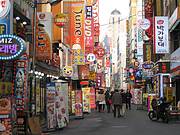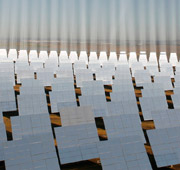IUCN Congress host's drive for 'green growth'
02 August 2012 | Article
Today we speak of green energy, green tourism, green economy, etc. Many make claims on this environmental buzzword. It seems there are many shades of green; but no palette as a reference, writes Célia Zwahlen.
South Korea has set the ambitious goal of becoming the world’s model for green growth. In a 2009 address, UN Secretary-General Ban Ki-Moon said: “No nation has shown more commitment to pursuing this low-carbon path via the national stimulus packages than the Republic of South Korea.”
This was a reference to the country’s response to the global financial crisis, namely an injection of US$ 38.5 billion in public spending for 2009-2012 intended to create 1 million jobs in long-term environmental projects. The “New Green Deal” is part of the broader National Strategy on Green Growth, which sets out policy objectives for 2050 and performance indicators for 2020.
First announced at the 60th anniversary of the Republic (a landmark number in Asian culture, as it corresponds to a full zodiac cycle), the Strategy is at the core of Korea’s vision for a changed future that supports the environment without compromising prosperity.
Dr Soogil Young, Chairman of the Korean Presidential Committee on Green Growth, describes green growth as “a new development paradigm which creates new growth engines and new jobs from green technologies and clean energies.”
He says: “Green growth, as first proposed by South Korea’s President Lee Myung-bak in August 2008, proposes to go beyond sustainability by seeing and seizing opportunities for sustained growth in the efforts to reduce greenhouse gas emission and environmental pollution. This requires broadening the policy horizon beyond the traditional energy and environmental measures.” Innovation is key.
The green growth perspective assumes that conservation cannot be pursued in isolation of economic goals. While the global debate on whether growth is sustainable or not in the long term continues, the IUCN Congress will demonstrate how a green economy is a vehicle to achieve sustainable development. It will highlight ways to incorporate the role of biodiversity and ecosystem services into our economic and social activities.
South Korea’s approach aims to integrate the green growth idea across all layers of society, from education to national defence for example. As reducing human impact on the environment requires people to change behaviours, Soogil Young believes that “Greening without the promise of growth would be politically a non-starter.”
Michael Breen, author of the book “The Koreans” and Chairman of Seoul-based Insight Communications Consultants, sheds light on this important aspect, which is often brought up when debating economic expansion and the global environment.
“The Korean position is that all countries have a right, and indeed are required, to develop economically. Wealth is good. Improved living standards are good. The needs of the environment should not hamper that natural desire to improve and develop. At the same time, we have a global problem that needs addressing. The effort of green growth is to find how to do this in a way that ensures both growth and sustainability,” he explains.
Environmental debate at the international level reveals time and again a cleavage between developed and developing countries. Why should emerging economies sacrifice their chance at prospering when the industrialized world had no restraint in becoming the biggest polluter? As a country that went through the transition from a developing to a developed economy, South Korea could well be the missing link in this dilemma.
“Korea’s experience as a developing country enables the country to offer credible advice to other developing economies on leapfrogging to green growth, and act as a bridge at international negotiations on climate change and sustainable development, in order to nurture mutual understanding and cooperation between the developing and the developed countries,” says Dr. Soogil Young.
The fact that South Korea’s first phase of nation-building was spent catching up on longer standing economic powers puts it at an advantage. Political leaders remember the transition. This enables them to see both sides of the coin at this crucial point where they voluntarily engage into a new kind of development. As a result, they can lay the foundations for policy objectives that reconcile the ideas of growth and sustainability, and fill a perceived gap in efficient global leadership.
As Michael Breen puts it, “I think the Koreans see an opportunity to take the lead and make a difference. As a recently developed country, many of its bureaucrats and politicians remember when the country was dirt poor and what it did to change. The international awareness of Korea’s sudden rise gives those leaders credibility in the eyes of emerging economies that leaders from long developed countries may lack.”
Korea’s proactive stand in international cooperation is already apparent. In June 2009, for example the government launched the Global Green Growth Institute (GGGI), an international research and advisory institute for emerging and developing countries. GGGI now works with the OECD, the World Bank and the United Nations Environmental Programme to launch and run a Green Growth Knowledge Platform.
Such integrated support, Dr. Soogil Young believes, will be necessary to keep up with global and national environmental goals. “Successful pursuit of green growth at the national level depends also on international cooperation to create a global green growth architecture including an effective climate change cooperation regime.”
Great achievements always start with great ambitions and the Koreans’ newly endorsed leadership intends to trigger no less than a fundamental shift in how growth and the environment work together. Real, tangible results will take time to unfold. However, let’s not forget green is also the colour of hope. It is a symbol of healing and signals the road ahead is clear.
“I believe that the idea of green growth is a unique and immensely valuable contribution by Korea to the global development of the 21st century,” concludes Soogil Young.
Célia Zwahlen is IUCN Congress Communications Officer.





